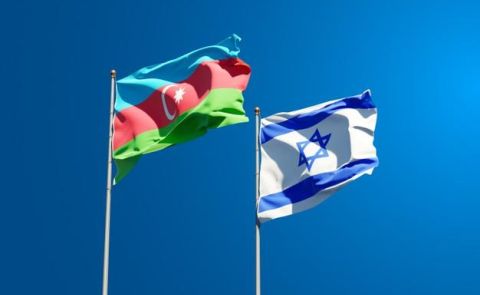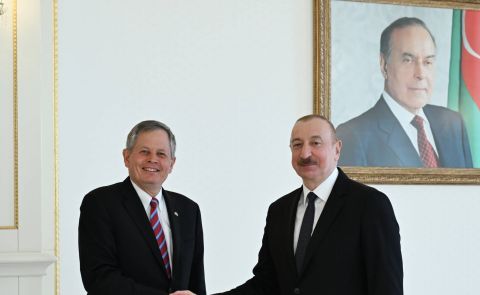
Georgia Adopts Foreign Agents Law Amidst Massive Protests
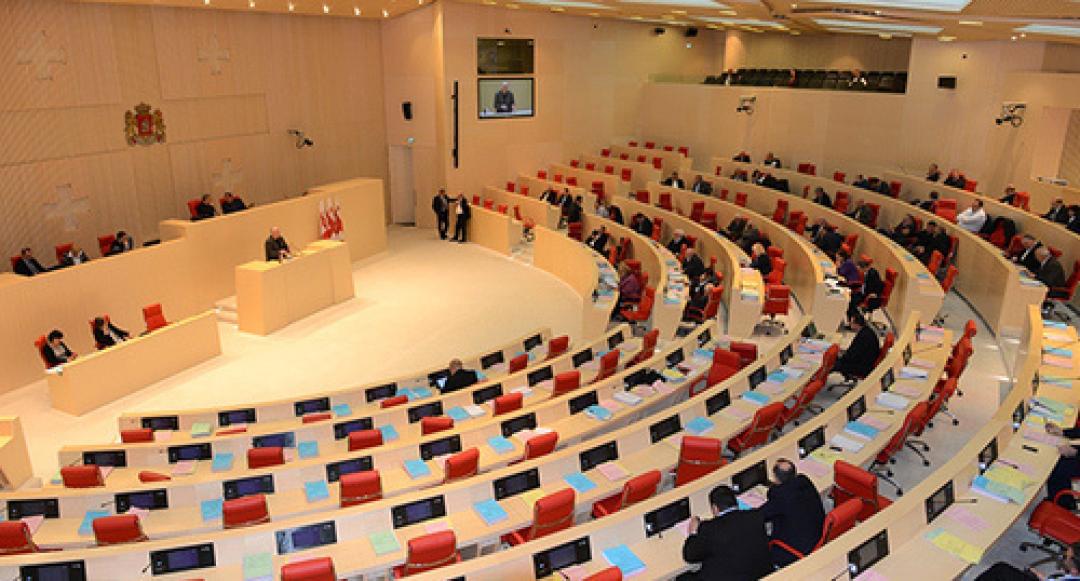
Parliament Adopts Foreign Agents Law
During a tense plenary session on May 14, Georgia's ruling party passed the contentious foreign agents' law in its third and final reading, with 84 votes in favor and 30 against.
The ruling Georgian Dream majority's endorsement of the law was marked by brawls among lawmakers, coinciding with a sizable group of protesters outside the parliament building. Anticipating the President's potential veto of the bill, demonstrators and Georgia's Western allies now have an extended window to exert further pressure on the party to retract the legislation.
Following the ruling majority's adoption of the foreign agents' law on May 14, amid substantial international criticism and significant domestic protests, several opposition parties, notably the United National Movement (UNM), Strategy Aghmashenebeli, Lelo for Georgia, and Citizens, alongside independent MPs Tamar Kordzaia and Tariel Nakaidze, declared a boycott of parliamentary activities.
Levan Bezhashvili of the UNM said, "Since the Russian regime has been formalized in the country, normal parliamentary work is impossible today." He criticized the ruling majority's conduct during the session, accusing them of inhibiting opposition voices.
Ana Natsvlishvili of Lelo for Georgia echoed this sentiment, declaring, "Today when all the red lines have been crossed. Lelo has decided to announce a boycott."
Subsequently, the UNM expanded its boycott to encompass all city councils [Sakrebulo]. MP Aleko Elisashvili, leader of the Citizens, emphasized the transition of the political process to peaceful resistance on the streets against what he characterized as the Russian government and law, leading to their decision to join the boycott.
During an interview with CNN's Christiane Amanpour, President Salome Zourabichvili asserted her commitment to spearheading the pro-European front comprised of opposition parties and civil society in the forthcoming elections. She clarified that while she does not intend to compete for a parliamentary seat, she will serve as a guarantor for this pro-Western and pro-European coalition.
President Zourabichvili's statement aligns with the recent announcements by various parties expressing their desire to establish a "European Platform of National Resistance."
In her conversation with CNN, President Zourabichvili criticized several laws, including the "foreign agent law," which she referred to as "the Russian law," along with other drafts such as those about the repatriation of offshore assets and placing the pension fund under the ruling party's control. She contended that these measures deviate Georgia from its path toward EU integration.
Acknowledging the symbolic nature of her veto power due to the ruling party's overwhelming majority in Parliament, Zourabichvili emphasized the necessity of mobilizing society and consolidating political parties to secure victory in the elections, emphasizing that such mobilization aligns with European principles.
While condemning the government's resort to violence and intimidation to suppress protests, which she likened to the "Russian way," Zourabichvili commended the mature civil society for leading the protests and praised the youth's patriotic, peaceful, and organized conduct.
In addressing Russia's stance on Georgia's EU rapprochement, particularly regarding potential membership, Zourabichvili acknowledged Russia's discontent but asserted, "Not everything happens the way that Russia likes it."
55 Human Rights Organizations Urge Action
On May 13, the day preceding the Georgian Parliament's vote on the contentious foreign agents law, a coalition comprising 55 international human rights organizations, civil society groups, and election observers issued a unified statement. Their joint appeal urged European and national leaders to promptly address the Georgian Dream government's efforts to suppress civil society ahead of the upcoming parliamentary elections in October. The European Platform for Democratic Elections/EPDE, releasing the statement, emphasized the critical need for international political support to safeguard Georgian democracy from encroaching authoritarianism, stating, "Urgent and decisive international political support for the Georgian civil society is crucial to defend Georgian democracy from Russian-style authoritarianism."
The coalition highlighted the stark parallels between the Georgian government-backed "law on transparency of foreign influence" and analogous legislation enacted in Russia in 2012. They asserted that this legislation imperils civil society and independent media by providing the government with tools for suppression. Additionally, they noted that the law diverges Georgia from its path toward EU integration. The CSOs emphasized that the proposed law, inspired by Russian legislation, constitutes a mechanism to stifle civil society and independent media, similar to its impact in Russia.
Furthermore, the coalition warned that if ratified, the law would grant the Georgian Dream government unprecedented means to curtail citizen oversight of the electoral process, unprecedented in scale, ahead of the crucial October parliamentary elections. They referenced the significant protests against the law and condemned the authorities' use of unprecedented violence to quell peaceful demonstrations, underscoring the imperative for international support for the Georgian people.
Controversy Between the US and Georgia
On May 14, amidst the crisis and international criticism surrounding the ruling Georgian Dream party's reintroduction of the law, Jim O'Brien, the US Assistant Secretary of State for European and Eurasian Affairs, commenced his visit to Georgia. O'Brien has already engaged in discussions with Georgian Prime Minister Irakli Kobakhidze and is scheduled to meet with opposition representatives.
A government press release on the meeting indicated a comprehensive discussion on all matters concerning Georgian-American relations, including recent developments in Georgia. Prime Minister Irakli Kobakhidze and US Assistant Secretary of State Jim O'Brien shared their concerns regarding these developments. Kobakhidze emphasized to O'Brien the necessity of enacting the Law on Transparency of Foreign Influence and reiterated the government's commitment to meticulously consider all legal feedback from international partners within the veto procedure.
Following the meeting, PM Kobakhidze conveyed via Twitter, "Held a lengthy meeting with the US Assistant Secretary Jim O'Brien, a frank discussion of all topics related to Georgia-US relations, including the development of events in Georgia in the past several years. During the meeting, we exchanged concerns about these events. I explained the need to pass a Law on Transparency of Foreign Influence to Jim O'Brien and once again expressed the readiness of the ruling team to consider all the legal arguments of international partners within the veto procedure with all due attention. I noted that the Government of Georgia is interested in deepening its partnership with the US which requires mutual effort and fair approach."
During the daily press briefing, White House Press Secretary Karine Jean-Pierre expressed the White House's deep concern regarding Georgia's enactment of foreign agents legislation resembling Kremlin practices. She emphasized that should this legislation be ratified, it would necessitate a fundamental reevaluation of the United States' relationship with Georgia.
Jean-Pierre underscored the US's vocal opposition to the legislation, noting its contradiction with democratic values and divergence from the principles of the European Union and NATO. She recognized the resilience of Georgian protestors who, undeterred by intimidation, voiced their opposition to the legislation in pursuit of a Euro-Atlantic future.
US Senators Jim Risch and Jeanne Shaheen, among others, jointly conveyed their profound disappointment with the Georgian parliament's passage of the foreign agents' law. They criticized the vote as disregarding the desires of hundreds of thousands of Georgians who continue to peacefully protest against legislation perceived as a threat to free speech and democratic progress in Georgia.
During a briefing held on May 14, US Assistant Secretary of State for European and Eurasian Affairs Jim O'Brien provided insights into his recent visit to Georgia and discussions with government officials, civil society representatives, and the opposition. Addressing the parliament's adoption of the foreign agents' law, O'Brien highlighted the potential consequences should it be enacted without amendments.
O'Brien affirmed the United States' deep appreciation for its strategic partnership with Georgia but expressed concerns regarding recent speeches and parliamentary actions, questioning whether their strategic interests align. He emphasized the substantial US assistance to Georgia since 1992, amounting to over $6 billion, which reflects their commitment to supporting Georgia's integration into European and Euro-Atlantic structures.
The Assistant Secretary noted two distinct conversations in Georgia, one revolving around the foreign agents' law. While some advocate for increased funding transparency, O'Brien emphasized the importance of aligning with EU and transatlantic norms. He conveyed to Georgian authorities that there would be consequences if the law was implemented without meeting these standards.
Responding to Prime Minister Kobakhidze's characterization of this stance as coercion, O'Brien clarified that Georgia's aspiration to join the EU and NATO necessitates adherence to their standards. He stressed that modifying the law by these norms would strengthen the partnership.
O'Brien also addressed the rhetoric surrounding a purported Western conspiracy to remove the Georgian Dream from office, describing it as unrealistic and a misunderstanding of the international community's relationship with Georgia. He cited Bidzina Ivanishvili's refusal to meet under the pretext of "de facto sanctions" as an example of misinformation.
Regarding demonstrations, O'Brien emphasized the importance of peaceful protests and denounced any intimidation of protesters or their property. He warned that if the law proceeds without conforming to EU norms and anti-US rhetoric persists, the US-Georgia relationship and a significant assistance package could be at risk. O'Brien cautioned that if the law undermines democracy and violence against peaceful protesters continues, the US may impose restrictions on individuals responsible for these actions.
He expressed hope that Georgia would realign with EU and NATO standards, emphasizing the importance of maintaining a robust democracy. Otherwise, the US would reconsider its stance on these matters.
During a press conference on May 14, Prime Minister Irakli Kobakhidze addressed various topics, including the Foreign Agents Law, the visit of US Assistant Secretary Jim O’Brien, and the potential imposition of US sanctions against GD Honorary Chairman Bidzina Ivanishvili.
Kobakhidze commenced the conference by lauding the Foreign Agents' Law, emphasizing the importance of transparency, a core EU value. He thanked the MPs who supported the bill and commended law enforcement officials for handling rally violence by EU standards. He urged protesters to abstain from violence and asserted Georgia's status as a free, sovereign, and dignified state, emphasizing the value of EU membership alongside sovereignty and dignity. He attributed the law's support to the Georgian people and pledged Georgia's EU membership by 2030.
Regarding his meeting with Assistant Secretary O'Brien, Kobakhidze highlighted its duration and characterized the discussion as sincere, claiming clarity was achieved on various matters. He stressed the need for a fair approach from the US to deepen bilateral relations and expressed readiness for discussions on the bill.
Responding to questions on the ongoing protests and international criticism, Kobakhidze defended the democratic process, acknowledging the right to protest but asserting the responsibility of MPs to represent the majority's will. He claimed 60% support for the law and dismissed the ability of the political minority to dictate legislative outcomes.
Regarding the assault on activist David Katsarava, Kobakhidze denied Russian involvement and attributed provocations along the occupation line to Katsarava. He dismissed claims of police brutality as unfounded.
Addressing discussions on potential US sanctions, Kobakhidze clarified that details were shared with O'Brien but declined to elaborate, citing a desire to protect partners' reputations. He justified Ivanishvili's perception of de facto sanctions and rejected the imposition of future sanctions as counterproductive.
Concerning foreign involvement in domestic affairs, Kobakhidze condemned interference and deemed it unacceptable, hinting at legislative measures to address such interference.
Regarding potential amendments to the Foreign Agents Law, Kobakhidze emphasized the simplicity of the law and the need for legal opinions before considering changes, reaffirming Georgia's commitment to state interests. He defended the decision not to await the Venice Commission's opinion, citing the timeline before the presidential veto.
Asked about the "Global Party of War," Kobakhidze referred to discussions with Assistant Secretary O'Brien but avoided elaborating, deeming the issue sensitive and dangerous.
Tension Arises Among Academic Circles
On May 14, Soso Berikashvili, the Dean of the School of Economics at Caucasus University (CU), revealed on Facebook that he was compelled to leave the university after criticizing Bidzina Ivanishvili, the founder of the ruling Georgian Dream party, regarding the contentious "offshore" law. This law permits shareholders of offshore companies to repatriate assets tax-free. Berikashvili recounted that on April 29, Kakha Shengelia, the university president, informed him of the State Security Service of Georgia's demand for his dismissal, alleging that Berikashvili had verbally attacked Ivanishvili. However, Berikashvili clarified that while he strongly criticized Ivanishvili over the "offshore law," he did not use profanity. Despite this, he was formally dismissed on May 7 under the pretext of "reorganization."
In response, Rector Shengelia refuted the allegations, branding Berikashvili as "the weakest dean and laziest employee" of the university. He accused Berikashvili of "treason" and deemed his actions "shameful." Shengelia admitted to maintaining a relationship with Berikashvili for the sake of the university but asserted that he was eventually compelled to terminate his employment. Shengelia also lamented that Berikashvili opportunistically capitalized on the coinciding protests against his dismissal.
Following Berikashvili's dismissal, several other lecturers, including Levan Berdzenishvili, Davit Kashiashvili, Niko Nergadze, Nino Robakidze, Salome Ugulava, Dato Chumburidze, Rusiko Kobakhidze, and Levan Moseshvili, resigned in protest against the rector's decision to endorse a letter signed by 38 rectors condemning the ongoing student boycott.
Moreover, the rectors of 38 universities collectively condemned the academic boycott by students and professors in response to the foreign agents' law, asserting that political processes should remain distinct from academic affairs. They deemed the refusal of some academic personnel to fulfill their duties unacceptable. Stressing the importance of providing young people with a free and non-discriminatory educational environment, the rectors insisted that political activities should not disrupt university operations or academic activities.
They denounced the profession's strike for violating students' constitutional rights and impeding the interests of those attending lectures. Emphasizing the obligation of each university and its faculty to maintain an uninterrupted educational process and foster a politically free and academically sound environment, the rectors reiterated that quality education is paramount for Georgia's advancement. They condemned using universities as platforms for political statements by certain groups, advocating instead for a focus on educational excellence.
Russia Reacts
On May 14, Russian Presidential Press Secretary Dmitry Peskov stated that Moscow has no intention to interfere in Georgia's internal affairs regarding the discussion of the bill on foreign agents. "It has already been said here several times that this is an internal matter for Georgia, and we in no way want to interfere there," Peskov affirmed.
Senator Grigory Karasin commented on the adoption of the law on foreign agents in Georgia amidst widespread protests. "In Georgia, the law on foreign agents was adopted in the final third reading. The advantage (84 - for, 30 - against) speaks for itself. This is a manifestation of the character of the current Georgian government. However, well-known Western sponsors and political strategists will not stop their intrigues. And yet, the result is the result!" Karasin emphasized.
See Also

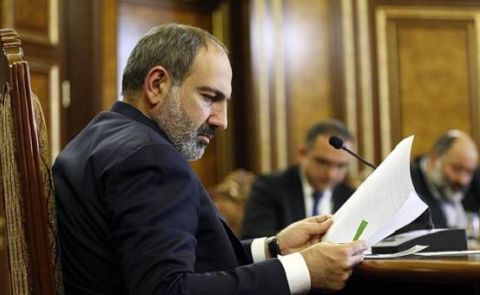
Pashinyan Commemorates First Republic Day, Highlights Progress in Sovereignty and Peace Efforts

Israeli Ambassador to Armenia Acknowledges Challenges but Optimistic About Future Armenian-Israeli Cooperation

EU Plans Closer Cooperation with Azerbaijan, Georgia, Türkiye, and Other Black Sea States
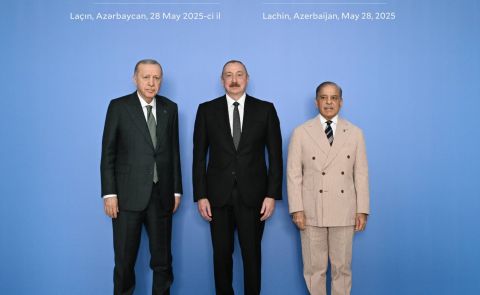
Azerbaijan, Türkiye, and Pakistan Highlight Growing Strategic Cooperation at Lachin Summit
